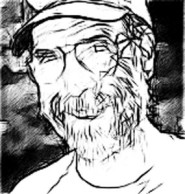by joe courter
We are just over a month since the death of Nelson Mandela, but I want to spend some words here on ways he and his struggle affected me.
In 1963 I was 12 years old and not aware of the South African struggle against apartheid, but in this country others were. Among them was a young man in Berkeley, CA named Mario Savio, who, as one of his first political activities, had gone door- to-door to free Nelson Mandela.
A year or so later Savio was one of the movement leaders during the Free Speech Movement. What was the genesis of the FSM? Information tables which were shut down, which had been set up by students who had gone to Mississippi for Mississippi Freedom Summer. My campus experience 1969 to 1973 was greatly impacted by the spirit of student protest which grew nationwide in opposition to the Viet Nam War.
Did the South African struggle motivate the U.S. Civil Rights Movement, which had been so advanced by Mississippi Freedom Summer? Undoubtedly. And there is a direct line from Civil Rights to the rise of the Women’s Movement, and specifically the founding of Gainesville Women’s Liberation in 1968. The women of that group did a huge amount to advance my thinking as an activist and organizer in the ’80s after I had moved to Gainesville and met them.
In 1985 there was a major push to have universities divest their financial holding in South Africa, and here at UF there was a 40-day occupation of the steps and entry to Tigert Hall by the Student Coalition Against Apartheid and Racism.
In fact, Tigert Hall was re-named Mandela Hall with a huge banner for the duration; I was in the van traveling back from a rally in DC when the decision was made to make the move on UF to crank up the pressure to divest, and was at many rallies out there on those steps. The Krishnas would even move their lunch servings over there on rally days.
On the day Mandela was freed, I was watching it live on TV with my father-in-law James Cooke Brown, and it was profoundly stunning to see this noble, tall man walking down the road from the jail, so different from the lone rather menacing photo which was in common usage. Then that evening Jim and I went to Cultural Arts Coalition director Nkwanda Jah’s house for a party and there witnessed Jim be reunited with Dan Harmeling after spotting each other across the room. They had been in jail together in St. Augustine after being arrested in a Civic Rights demonstration in 1963, and had not seen each other since then.
Weeks later Nelson Mandela went on a speaking tour of a half dozen or so large arenas, and four of us drove up to Atlanta and saw him at the Georgia Tech football stadium. Unforgettable.
It was painful to hear his legacy so often trivialized or worse following his death. With brave perseverance and flexible tactics he is not a person to be dismissed in a sound bite, much as Martin Luther King has been with the frozen moment “I Have a Dream” speech. From a continent away he changed my life and had influence on me, on how I view the world, and directly on the world I live in. We lost a great one when he died.
The best program I heard remembering Mandela was the NPR show “Q” from Dec. 6; I recommend listening to it when you can take the time to spend an hour.
***
I’d like to dedicate this issue to Jamie Garvey, whose shocking death has really hit a lot of us hard. I met Jamie when he was 14 and came to the CMC to do community service. In our first conversation he revealed himself as someone with a lot of smarts, a lot of energy, and just not cut out to fit in to the mainstream. I watched him find friends and artistic outlets, he formed a band called Commie Hilfiger whose graffiti tags lasted a lot longer than the band, and over the last decade and a half had many a brief conversation. Nothing deep, just “howya doin’, whatcha doin’” stuff. He touched so many people, and now with his death he has brought out a shared sense of community. In this fucked up world of wars, greed, exploitation and heartlessness, we have each other, and we need to show each other love, empathy and support. And maybe sometimes go deeper than “howya doin’, whatcha doin’.” We just lost a member of the Gainesville family, but in the process, our family got a bigger and closer.

